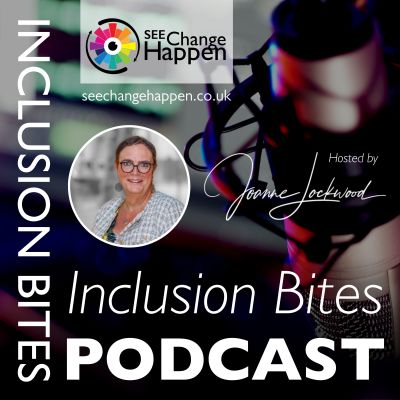Welcome to Inclusion Bites, where your host, Joanne Lockwood, dares to delve deep into the transformative world of Inclusive Cultures and Nurturing Belonging. Uncover the untold stories, challenges, and triumphs as Joanne engages with a dynamic roster of changemakers. Whether you're an HR aficionado, a Diversity & Inclusion champion, or someone who craves meaningful conversations that disrupt the status quo, this is the podcast for you. No room for surface-level chatter—strap in for conversations that not only inspire but also equip you with actionable insights. This isn't just another diversity podcast; this is a call to action. Unplug from the noise, tune into Inclusion Bites, and prepare to be enlightened, one bold conversation at a time. #InclusionBites ????✨
https://seechangehappen.co.uk/inclusion-bites-listen
episode 7: Insights from the science of happiness & positive emotions
Insights from the science of happiness & positive emotions
Nic talks about how the use of statistics and people science allows us to look for trends and opportunities to see how people are likely to react to certain situations.
Nic is a statistician, a trained therapist, TED Speaker (without the X) and the founder of Friday Pulse, who specialise in measuring and improving team morale. Nic says that his super power is being able to see the patterns between things, and then being able to communicate that simply without being simplistic. In this episode Nic talks about his TED Talk experience and how his organisation is working with companies to measure the impact of people focused initiatives.
Published: 13.06.2020 Recorded: 29.04.2020 Duration: 0:49:46 Downloads: 35 Shownotes:Joanne sat down with Nic Marks a statistician, trained therapist, TED speaker and Founder of the Friday Pubs to discuss his insights on the science of happiness and positive emotions.
Nic starts by reasoning that you need to ask ‘what is happiness’ and do people have different definitions. Happiness can be considered as both an emotion and a thought and people project their own things on to it. Nic’s work predominantly focuses on trying to help people lead better lives and he uses his statistical background to assist with this, looking at patterns and tracking peoples’ behaviour.
He does warn that when evaluating statistical evidence, you need to ensure you don’t hide individual variability. He cites previous population researchers who looked at happiness compared to age which showed that the least happy age is 42, however this fails to consider the number of people that are happy at this age and may be unhappy in their early teens or retirement years.
We can change the plasticity of our brain by your behaviour and mindfulness/meditation are meant to help with this.
We all have biases, and these can be seen especially in friendship groups. You instinctively trust someone that looks/sounds similar to you. Our biases are almost like a sorting algorithm – we categorise as we cannot pay attention to every detail as it would be too much information.
Everybody has a negativity bias where we pay attention to negative news/information more than we do positive. From Nic’s experience he believes when there is an overwhelming about of negative news (such as with the COVID pandemic), people tend to switch off as they simply cannot process the information or feel like they can cope. He has found that 7 weeks into lockdown many of his clients seem to have absorbed the shock and are now working towards acceptance of the new ‘normal’, but people’s bounce back ability will vary depending on their individual experiences. There are some elements of this that people may want to remain, i.e. working from home, however people are missing human contact.
From studies that Nic has conducted on happiness in populations and at work he has found there to be huge differences between groups of people. Within the workplace professions with higher human contact are happier than you would expect for their income and happier than those with minimal human contact despite their income. Income does have an impact as it can protect you from misery. The results showed differences between size of organisations, with people preferring the autonomy smaller businesses bring. It also showed that London is the least happy region within the UK, and this is affected by the density of population, impacting stress levels, and highlighting inequalities. Rural people tend to be happier than urban with the happiest region being Northern Ireland where they have a bigger sense of community and belonging.
Nic has found during this pandemic that he checks in with his team more – ensuring he makes time to speak to them all. People want to be able to share and the ‘how are you?’ conversation has really changed. He believes that the currency of happiness and wellbeing is time.
Please connect with our hosts and guests, why not make contact..?Brought to you by your host Joanne Lockwood
SEE Change Happen
A huge thank you to our wonderful guest Nic Marks
Friday Pulse
The post Insights from the science of happiness and positive emotions appeared first on SEE Change Happen: The Inclusive Culture Experts.
